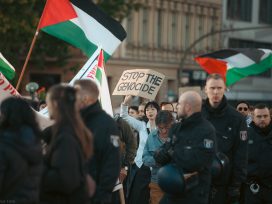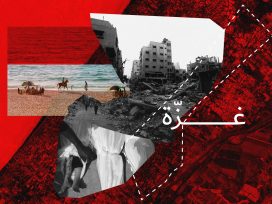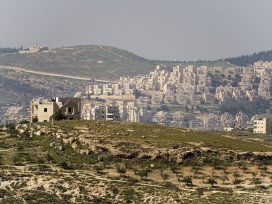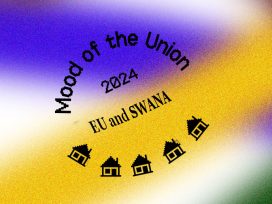Focusing on the conflict in Gaza, Esprit asks how we can ‘intellectually assess an event of such a scale, one that has already polarised public opinion around the world’?
A group of intellectuals in the fields of political science, philosophy and human rights attempt an answer. Denis Charbit says that the Hamas attacks on 7 October ‘make no sense; it’s what we do afterwards that will’; Firas Kontar comments that Netanyahu ‘knew that the liquidation of the peace process would generate reactions’ – though perhaps not on this scale; and Eva Illouz fears that ‘the violence will continue until one of the two sides manages to overpower, expel, drive out or kill the other for good’.
The contributors criticize the reactions of western academics, politicians and governments, from Germany’s ‘unconditional defence’ of Israel to assertions that the 7 October attacks were comprehensible as ‘the inevitable consequence of Israeli colonisation’.
Also discussed are the various positions taken by the French left: the equation of Jewish nationalism with colonialism, or the preference of La France insoumise for the term ‘war crimes’ over ‘terrorism’ to describe Hamas attacks on Israeli civilians. Susan Neiman calls for greater nuance, noting that ‘it was possible … to be horrified by the carnage at the World Trade Center and still be opposed to the war in Iraq’.
What will be the conflict’s aftermath? Terrorist acts provoke state responses that weaken international institutions. With its effectiveness in doubt, Dan Arbib wonders whether the UN ‘is gradually transforming into a club for pressure groups’. A political solution is the responsibility of the US and Europe, amid the normalisation of relations between Israel and several Arab countries. Whether Israel chooses ‘to exist in a pacified environment or continue to establish itself by force … will have a decisive impact on the region’s future’, comments Kontar.
 Road to peace
Road to peace
Political scientist Joseph Bahout positions the conflict in the wider context of the region. In negotiations leading to the Abraham Accords – brokered by the US, which has been forced back into the Middle East as an intermediary – the Palestinian cause ‘literally disappeared’. The unfolding of events could therefore be considered ‘a victory for Hamas’.
Iran is ‘rushing to fill the void left by Arab states to defend the Palestinian cause’, although in allied Lebanon, nearly 70% of citizens do not want the conflict to spill over into their country or for Hezbollah to become involved. Meanwhile, Egypt, Jordan, Saudi Arabia and Qatar are returning to the negotiating table.
If Europe wants a part in the action it must face up to its ‘double standards,’ writes Bahout. These ‘rightly point to the barbarism of Hamas but never speak about Netanyahu’s exploitation of the Old Testament to justify the erasure of entire villages’ – not to mention the disunity in statements made by European leaders.
The conflict, which ‘is beyond all military rationality’, begs several questions: What kind of peaceful solution could be universally accepted? Who will be involved in negotiations? What leadership for Gaza will emerge afterwards? How will it deal with the nearly 1 million displaced Gazans and reintegrate the 40,000 to 50,000 Hamas members into an administration that must be formed from scratch?
Wars of de-civilization
Historian Hamit Bozarslan identifies similarities between the conflict in Gaza and other ‘wars of de-civilisation’ from the last decade in Syria, Ukraine and Azerbaijan. These wars are started by a ‘sovereign entity’ that intends to destroy or de-territorialize the ‘enemy nation’. They also feature ‘the intervention of antidemocratic regimes, who might be at each other’s throats but might also work together’ and enjoy relative impunity.
While ‘Israel’s historic and democratic legitimacy has taken a beating in the last few decades’, the Palestinian leadership has its own legitimacy crisis: officials in Ramallah refuse to hold elections and the ageing Mahmoud Abbas is absent from the public stage. Plus, Hamas defeats itself with ‘its jihadist discourse, its refusal to recognise Israel … [and] its armed occupation of the Gaza Strip’. But it has managed to exploit the legitimacy of the Palestinian cause to become an actor that must be considered in negotiations.
Democracies can and should encourage a ‘self-awareness of history’ and remember what Hillel the Elder said in the Talmud: ‘That which is hateful to you, do not do to another.’ Israelis and Palestinians should both reflect on the Book of Jeremiah: ‘Everyone will die for their own sin; whoever eats sour grapes – their own teeth will be set on edge.’

Published in cooperation with CAIRN International Edition, translated and edited by Cadenza Academic Translations.
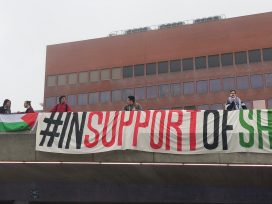
 Road to peace
Road to peace


